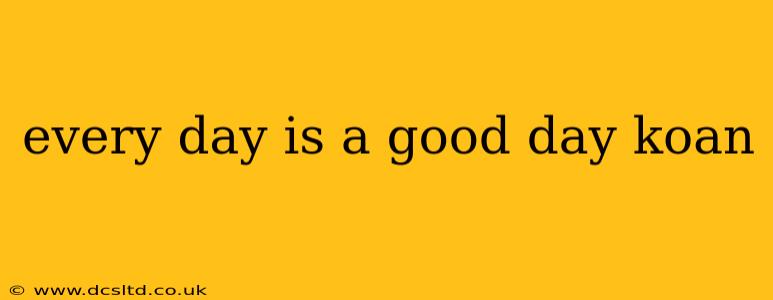The deceptively simple statement, "Every day is a good day," acts as a powerful koan, a paradoxical statement used in Zen Buddhism to challenge conventional thinking and spur enlightenment. It's not a simple declaration of unwavering optimism; rather, it's an invitation to explore the nature of perception and the inherent goodness within every moment, even amidst suffering. This exploration goes beyond superficial positivity and delves into the heart of Zen practice.
What Does "Every Day is a Good Day" Really Mean?
At first glance, the koan seems naive. Life inevitably presents challenges – illness, loss, disappointment. To claim every day is good seemingly ignores the realities of human experience. However, the koan's power lies in its refusal to accept a dualistic view of good and bad. It challenges us to question our assumptions about what constitutes a "good" or "bad" day.
This isn't about denying negative emotions or pretending hardship doesn't exist. Instead, it's about shifting perspective. The koan suggests that even within difficult experiences, there's something to be learned, something to appreciate, a potential for growth. The "goodness" isn't necessarily in the external circumstances but in our internal response, our capacity to find meaning and acceptance.
How Can Every Day Be a Good Day, Even When Things Are Difficult?
This is where the practice of mindfulness becomes crucial. By cultivating awareness of the present moment, without judgment, we can begin to see the subtle goodness even in challenging situations. This might involve:
- Finding gratitude: Even on the toughest days, there are likely things to be grateful for – a warm meal, a supportive friend, the simple act of breathing. Practicing gratitude shifts our focus from what's lacking to what's present.
- Acceptance: Acceptance doesn't mean resignation; it means acknowledging the reality of the situation without resistance. This allows us to move through difficult emotions with greater ease and clarity.
- Learning from challenges: Difficulties inevitably present opportunities for growth and learning. By viewing challenges as teachers, we can extract valuable lessons and emerge stronger.
Is it Possible to Always Maintain a Positive Outlook?
No, the koan isn't about forced positivity or suppressing negative emotions. Genuine acceptance encompasses the full spectrum of human experience, including sadness, anger, and frustration. The goal isn't to eradicate negative feelings but to cultivate a more balanced perspective, recognizing that even difficult emotions are transient and can be navigated with mindfulness and self-compassion.
What if I'm Going Through a Prolonged Period of Suffering?
Even during prolonged periods of hardship, the core principle remains. The "goodness" isn't necessarily about feeling happy all the time; it’s about maintaining a sense of presence, finding meaning within the experience, and cultivating inner resilience. This can involve seeking support from others, engaging in self-care practices, and focusing on what you can control rather than what you can't.
How Can I Apply This Koan to My Daily Life?
The koan serves as a daily reminder to approach life with awareness and acceptance. It encourages a mindful approach to each moment, fostering a deeper appreciation for the present, regardless of external circumstances. Simple practices like meditation, journaling, and spending time in nature can facilitate this process. The key is to cultivate a consistent practice of mindfulness and self-reflection.
In conclusion, "Every day is a good day" isn't a naive statement of blind optimism; it's a profound invitation to cultivate a deeper understanding of ourselves and the world around us. It's a journey of self-discovery, a path toward embracing the full spectrum of human experience with wisdom, compassion, and unwavering presence.
